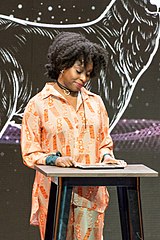
Adichie, an author, spoke at the Atlantic Festival this year. Photo: Wikimedia Commons.
“Meet great minds who don’t think alike,” The Atlantic wrote in a press release in advance of its annual festival. The festival originated as the Washington Ideas Forum in 2008. Soon after, The Atlantic, “founded by leading abolitionists to illuminate the American Idea” in 1857 with the aim to “inspire” and “challenge” readers, took the festival under its auspices. This year, the event was held from Sept. 28–29 at the Wharf.
Luminaries speaking at the Atlantic Festival included acclaimed author Chimamanda Ngozi Adichie, Chief Technology Officer of OpenAI Mira Murati, National Climate Advisor Ali Zaidi, former Secretary of State Hillary Rodham Clinton and Representative Nancy Pelosi.
While conversations and forums were a large part of the festival, there were many other activities in which the festival’s attendees could participate. According to Candace Montgomery, the senior vice president and general manager of AtlanticLIVE, the event’s planners “thought through a full attendee experience.”
“The festival tries not only to tap into the most consequential issues, but also the cultural zeitgeist, and also make it interactive so that people feel engaged,” Montgomery explained in an interview with the Horizon.
The festival was designed such that “attendees could go to a book talk, with a screening in the evening, or hear ‘Live Storytelling,’ a cultural moment that delved a little deeper into artists Jemele Hill and Spike Lee’s backgrounds, giving an insider’s view into how they got there and what’s coming up next,” she described.
In Montgomery’s words, viewers could “get a little bit of everything… The Atlantic Festival is the one place where you get to see the magazine leap off the page.”
The ability of great minds not to think alike was a central theme of the Ideas Stages, evident especially in Adichie’s conversation about free speech and constrictive narratives with Atlantic book editor Gal Beckerman.
Referencing a 2009 talk by the author in which she decried the dangers of imposing a “single story,” a single defining narrative, on another person, Beckerman wondered if the novelist anticipated the modern tendency to impose those stories — such as political identity — on oneself as well. Adichie replied that “With this… social censure hanging over people, it’s much more difficult… to create, to write… I constantly have to say to people, ‘It’s okay. You can actually write that.’”
The governor of Utah, Spencer Cox, made a similar case against tribalism. Cox believes that America is living through “an 1850s drain of trust from the system.” He blames this on a “perception gap” exacerbated by media and social media that “reward the most extreme voices.”
“If you think that the other side is willing to violate democratic norms, if you think the other side is willing to engage in political violence, if you think the other side is willing to do all these crazy things, then you give permission to your side to do the same thing. That’s what’s dangerous — we start trying to one up each other,” he said.
He advised his audience to “engage kindly and curiously… [because] it’s up to all of us to change this and reach out.”